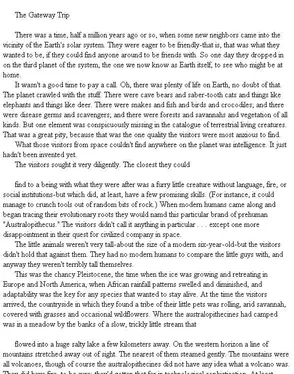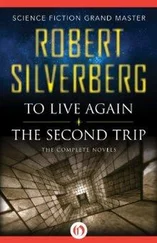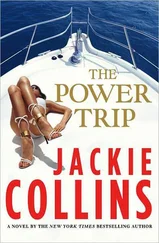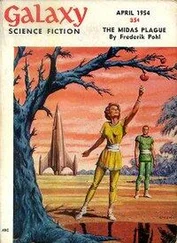Pohl, Frederik - The Gateway Trip
Здесь есть возможность читать онлайн «Pohl, Frederik - The Gateway Trip» весь текст электронной книги совершенно бесплатно (целиком полную версию без сокращений). В некоторых случаях можно слушать аудио, скачать через торрент в формате fb2 и присутствует краткое содержание. Жанр: Старинная литература, на английском языке. Описание произведения, (предисловие) а так же отзывы посетителей доступны на портале библиотеки ЛибКат.
- Название:The Gateway Trip
- Автор:
- Жанр:
- Год:неизвестен
- ISBN:нет данных
- Рейтинг книги:4 / 5. Голосов: 1
-
Избранное:Добавить в избранное
- Отзывы:
-
Ваша оценка:
- 80
- 1
- 2
- 3
- 4
- 5
The Gateway Trip: краткое содержание, описание и аннотация
Предлагаем к чтению аннотацию, описание, краткое содержание или предисловие (зависит от того, что написал сам автор книги «The Gateway Trip»). Если вы не нашли необходимую информацию о книге — напишите в комментариях, мы постараемся отыскать её.
The Gateway Trip — читать онлайн бесплатно полную книгу (весь текст) целиком
Ниже представлен текст книги, разбитый по страницам. Система сохранения места последней прочитанной страницы, позволяет с удобством читать онлайн бесплатно книгу «The Gateway Trip», без необходимости каждый раз заново искать на чём Вы остановились. Поставьте закладку, и сможете в любой момент перейти на страницу, на которой закончили чтение.
Интервал:
Закладка:
So there were two kinds of human beings on Earth. If you owned a few thousand shares of PetroFood or Chemways you didn't lack for much-not even health, because then you could afford Full Medical. But if you didn't
If you didn't, the next best thing was to have a job. Any kind of a job.
Having a job was a dream of Utopia for the billions who had none, but for those who did have employment their work was generally a demeaning kind of drudgery that drowned the spirit and damaged the health. The food mines employed many, dipping fossil fuels out of the ground and breeding edible single-cell protein creatures on their hydrocarbon content. But when you worked at a food mine you breathed those same hydrocarbons every day-it was like
living in a closed garage, with motors running all the time-and you probably died young. Factory work was better, a little, although the safest and most challenging parts of it were generally done by automatic machines for economic reasons; because they were more expensive to acquire, and to replace when damaged, than people. There was even domestic service as a possible career. But to be a servant in the homes of the wealthy was to be a slave, with a slave's intimate experience of luxury and plenty, and a slave's despair at ever attaining those things for himself.
Still, the ones who had even those jobs were lucky, for family agriculture was just a way of slowing down starvation, and in the developed world unemployment was terribly high. Especially in the cities. Especially for the young. So if you were one of the really rich, or even just one of the well-to-do, splurging on a trip to New York or Paris or Beijing, you usually saw the poor ones only when you walked out of your hotel, between police barricades, and into your waiting taxi.
You didn't have to do it that way. The police barricades were all one-way. If you chose to cross them the police would let you through. A grizzled old cop might try to warn you that going out among the crowds was a bad idea, if he happened to be charitably moved. But none of them would stop you if you insisted.
Then you were on your own. Which meant that you were immediately plunged into a noisy, smelly, dirty kind of unbarred zoo where you were immersed in a crowd of clamoring vendors: of drugs; of plastic reproductions of the Great Wall, the Eiffel Tower, or the New York Bubble; of handmade key charms and hand-carved trinkets; of guide services, or discount coupons to night clubs; of-very often-themselves. That was a scary experience for any member of the privileged classes encountering it for the first time. It wasn't necessarily very dangerous, though. The police wouldn't actually let them murder you or snatch your wallet-as long as you were in sight, anyway.
Quite often, the charging poor wouldn't harm you even if they
succeeded in luring you away from the police cordons, especially if you offered them some less chancy way of making money from you. But that was not guaranteed. Most of the poor people were desperate.
For the rich, of course, the world was quite different. It always
is. The rich lived long, healthy lives with other people's organs replacing any of their own that wore out. They lived those lives in balmy climates under the domes of major cities, if they chose, or
cruising the warm and still-unpolluted southern seas, or even traveling in space for the pure joy of it. When there were wars (and there often were, frequent though small-though quite large enough, of course, to satisfy the people killed in them), the rich went elsewhere until the wars were over. They felt that was their due. After all, they were the ones who paid the taxes-as much as they couldn't avoid, anyway.
The main trouble with being rich was that not all of the poor
people acquiesced in being poor. Quite a few tried to find ways to better themselves, and sometimes they did so violently.
Kidnapping became a growth industry in America again. So did extortion. You paid what they demanded, or out of hiding someone would shoot away your kneecap (or torch your house, or boobytrap your flyer, or poison your pets). Few in the solvent classes would send their children to school without a bodyguard anymore. That did have a useful side effect. As it turned out, it helped ease the unemployment situation, a little, as some millions of the extortionists put on uniforms and began drawing salaries to protect their employers against extortion.
And, of course, there was political terror, too. It flourished in the same soil that nurtured kidnapping and extortion, and there was even more of it. Among the apathetic majority of the landless and
the hungry, there were always a few who banded together to work the vengeance of the have-nots on the haves. Hostages were taken, officials were shot from ambush, aircraft were bombed out of the sky, reservoirs were poisoned, food supplies infected . . . oh, there were a thousand ingenious, injurious tricks the terror-wielders devised, and all of them devastating-at least, to those who had something to lose in the first place.
Nevertheless, in spite of all the fears and inconveniences, the haves had it made. And most other people didn't even have hope.
Then, into the life of this seething, overfull planet, along came Gateway.
For most of the ten billion people alive on the used-up planet of Earth, Gateway was an unexpected hope of paradise. Like the gold-rush miners of '49, like the hungry Irish fleeing their potato famine in the holds of immigrant ships, like the sodbusting pioneers of the American West and human emigrants everywhere, through all of history, the poverty-stricken billions were willing to take any risk for the sake of-well, wealth, if wealth could be had; but at least for a chance to feed and clothe and house their children.
Even the rich saw that this surprising new event might offer
them a good chance to get even richer. That made for a serious problem, for a while. The national governments who had built the space rockets that first visited other planets and later supported the Gateway operation felt they were entitled to whatever profits came out of the Gateway discoveries. The rich people who owned the governments agreed. But they couldn't all own it, after all.
So there was a certain amount of buying and selling and horse-trading (and some pretty cutthroat wheeling and dealing, too, with the stakes as high as they were). Compromises were made. Bargains were struck; and out of the competing greeds of all the claimants to the limitless wealth that the galaxy promised came the just, or fairly just, invention of the Gateway Corporation.
Was Gateway a benefit to Earth's poor?
At first, not very much. It gave each of them a little hope-the hope of a lottery ticket, although few of them could raise the money even to buy that one-way ticket that might make them into winners. But it was a long time before any stay-at-home peasant or slum-dweller was a penny or a meal richer for anything the Heechee had left behind.
In fact, the knowledge that there were rich, empty planets out there was more tantalizing than useful to Earth's teeming billions. The livable planets were too far away. They could only be reached by faster-than-light travel. Although human beings actually improved on some Heechee space-travel techniques (using Lofstrom ioops to get into orbit instead of Heechee landers, for instance, and thus sparing further damage to the acidified lakes and the ozone layer), no one had the slightest idea of how to build a Heechee ship-and the ships on Gateway were far too few and much too small to carry sizable migrant populations to the new planets.
So a few prospectors got rich, when they didn't get dead instead. A number of rich people got quickly richer. But most of the penniless billions stayed on Earth.
And in the cities like Calcutta, with its two hundred million paupers, and on the starved farms and paddies of Africa and the Orient, hunger remained a fact of life, and terrorism and poverty got worse instead of better.
Читать дальшеИнтервал:
Закладка:
Похожие книги на «The Gateway Trip»
Представляем Вашему вниманию похожие книги на «The Gateway Trip» списком для выбора. Мы отобрали схожую по названию и смыслу литературу в надежде предоставить читателям больше вариантов отыскать новые, интересные, ещё непрочитанные произведения.
Обсуждение, отзывы о книге «The Gateway Trip» и просто собственные мнения читателей. Оставьте ваши комментарии, напишите, что Вы думаете о произведении, его смысле или главных героях. Укажите что конкретно понравилось, а что нет, и почему Вы так считаете.












